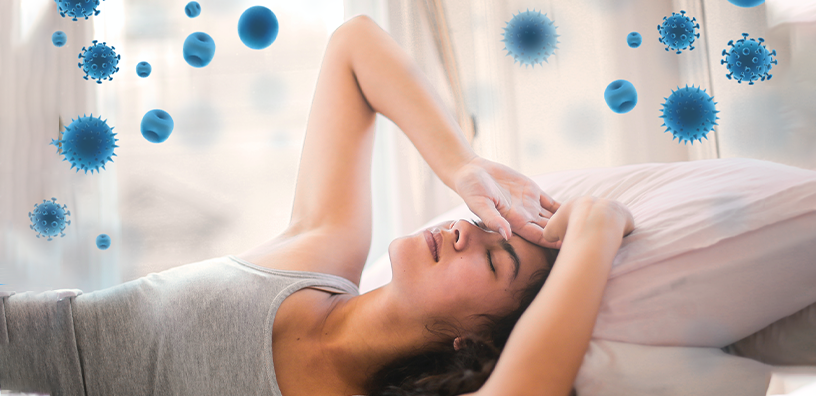
Is Coronavirus Affecting Your Sleep?
In the last few months, the term “Insomnia” has risen to be one of the most popular Google Search terms. It’s safe to say that COVID-19 has become the driving force behind these searches. As more and more Americans are faced with the prospect of serious illness, lack of sleep has become increasingly prevalent. So, why can’t we sleep, how is coronavirus affecting the way we relax and sleep on a daily and nightly basis and how can we fix it?
What causes insomnia?
The main causes of sleepless nights are anxiety and stress. Though they are similar, these terms are not the same. Anxiety is the feeling of nervousness or worry that comes with uncertainty. Stress, on the other hand, is a mental or emotional strain based on an adverse situation. The Coronavirus pandemic has certainly become a source of anxiety and stress for people around the globe.*
Whether situational or chronic, anxiety and stress can cause a myriad of symptoms, insomnia being the most common. In fact, research has shown that many who suffer from anxiety and stress for long periods of time can get caught in a loop.*
When anyone gets anxious, they are likely to lose sleep. In turn, sleep deprivation causes stress and anxiety to present more easily. When stress and anxiety appears, it causes more sleep problems. This cycle continues, pushing the sufferer into sleepless nights, worrying about the future.*
So what’s happening in your brain when you can’t sleep?
There are two parts of the brain that are responsible for dealing with anxiety and stress. The first is the amygdala. The amygdala processes memory, decision-making, and emotional response. The second is the hippocampus. The hippocampus is integral to learning and memory.*

When the brain perceives a threat, it triggers a response known as fight, flight, or freeze. Through the release of hormones, the body prepares to either fight off the threat, run from the threat, or simply freeze in place. This threat could be a physical or perceived threat. The characteristics of this response include an increased heart rate, sweating, shaking, pacing, among others.*
What are the long term effects of lack of sleep and insomnia?
The long term effects of stress and anxiety go deeper than just insomnia. Effects include:
- Weight gain and eating disorders
- Heart disease
- Insomnia
- Weakened immune system
- High risk for depression
- High risk of dementia
- Skin conditions like acne and psoriasis
- Hair thinning, greying, and loss
- Gastrointestinal issues
How do we stop stress and sleep better?
Reading the effects that stress and anxiety can have on the body in both the short and long terms can be extremely frightening. It’s important during a time of extreme uncertainty, such as a global pandemic, that we focus on incorporating stress-relieving practices into our daily routines.
Create and stick to a new routine
During a pandemic, there really is no “normal.” Lives are not only on the line, but the threat of illness looms close to home. It’s likely that your routine has been turned on its head. The body thrives off routine and structure, so you must create a “new normal.” Wake up at the same time each day, eat breakfast, and find something to occupy your time. The more time you spend sitting and thinking, the more stressed you’ll feel. Create a new routine.

Take breaks from news and technology
It can feel like the news is always negative. While you should be conscious of what’s going on, filling your head with a constant stream of anxiety-inducing information can cause further descent into stress. Give yourself time every day to relax, away from screens and news. This is especially important close to bedtime. Technology has a tendency to keep us awake, so check out about an hour or two before bed to have the best chance of a full night’s sleep.
Eat healthily and exercise
This may sound like a no-brainer, but now more than ever it’s important to stay active and watch what we eat. Does this mean you have to go for a 5-mile run or ban yourself from a bag of chips? Not at all! Any movement is good movement, whether it’s a 5-mile run or a walk around the block. Give your body a chance to burn its stress-fueled energy, and the same goes for eating. You don’t have to swear off snacks to be healthy. Add fresh fruits and veggies to your meals and eat snacks in moderation.

Meditate
We’re going to be honest with you, meditation isn’t for everyone. However, we believe it’s a fantastic tool for centering your mind and taking a moment to yourself. It can be as simple as sitting quietly for five minutes each morning. Get comfortable, take deep, slow breaths, and listen to the world around you. There’s no need to fight away thoughts (we all have them). Instead, imagine your thoughts like clouds floating by. Acknowledge their presence and send them gently on their way. As you get more comfortable, increase the time. In no time you’ll be meditating like a pro.
Invest in quality bedding
It’s extremely important that in a time of stress, anxiety, and crisis that your bed is a safe, soothing haven for your brain to rest. The best method for this is investing in quality, comfortable bedding that will help carry you into sleep. The most popular bedding material on the market is bamboo viscose. Bamboo viscose has natural cooling properties that allow air to pass easily through, keeping you cool and wicking away moisture. Bamboo viscose is also naturally hypoallergenic, resisting odors, stains, and warding off common household non-living allergens. We highly recommend the Cosy House Luxury Bed Sheets and Luxury Pillows for the ultimate security and comfort.
We've gone ahead & enclosed a 10% off coupon below for you to use if you'd like to take the plunge and try out our sheets for yourself! To shop our collection & get 10% OFF Use the code 'BLOG10' at checkout.
Resources:
Johnson, J. (2018). Stress and sleep: What's the link? Medical News Today. Retrieved from https://www.medicalnewstoday.com/articles/322994#:~:text=It%20is%20normal%20to%20feel,it%20can%20cause%20sleep%20deprivation.
ScienceDaily. (2020, November 18). Web searches for insomnia surged at height of covid-19 stay-at-home orders. ScienceDaily. Retrieved from https://www.sciencedaily.com/releases/2020/11/201118141724.htm.
Watson, S. (2021, December 15). 11 effects of sleep deprivation on your body. Healthline. Retrieved from https://www.healthline.com/health/sleep-deprivation/effects-on-body#:~:text=Sleep%20deprivation%20leaves%20your%20brain,increasing%20your%20risk%20for%20accidents.
Mathewson, S. (2017, November 7). Here's what happens in the brain when you don't get enough sleep. LiveScience. Retrieved from https://www.livescience.com/60875-sleep-deprivation-sluggish-brain-cells.html.
Mayo Foundation for Medical Education and Research. (2016, October 15). Insomnia. Mayo Clinic. Retrieved from https://www.mayoclinic.org/diseases-conditions/insomnia/symptoms-causes/syc-20355167.

